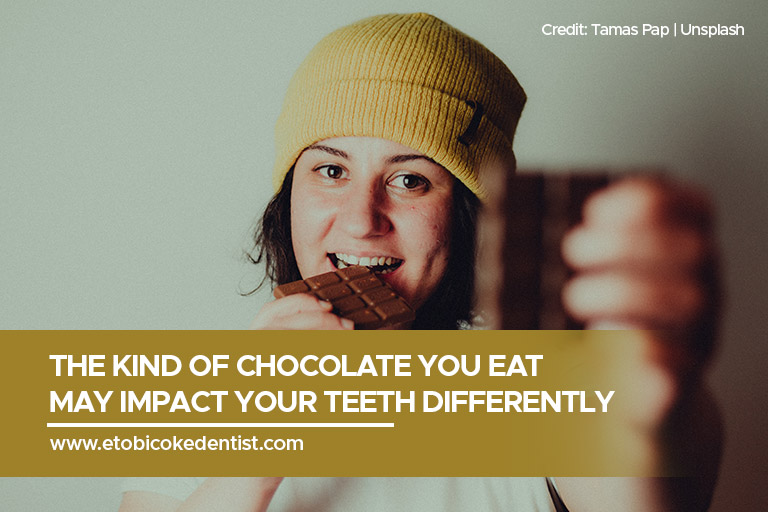The love month is the time to snack on a few chocolate treats. You may be wondering how you can enjoy all these sweets without harming your teeth.
Different chocolates have different effects on your dental health, but tooth damage from chocolate may be readily avoided with only a few steps. Here are some tips you should know about chocolates and your teeth.
Does Chocolate Affect the Teeth?

Tooth decay and bacterial growth are possible side effects of excessive chocolate consumption, but this is also true for all other high-sugar foods. Chocolate, itself, is no worse for your teeth than any other sweet indulgence, including soda, hard candies, or other junk foods. However, not every chocolate is the same.
Milk chocolate is the most widely consumed variety of chocolate, but is also the sweetest. Compared to other chocolate varieties like dark chocolate or white chocolate, milk chocolate has a greater negative impact on your oral health since it contains more sugar. Additionally, many milk chocolate treats include fillings that are just as sugar-heavy. As well as having milk chocolate drizzled over fruits and sugared nuts, many chocolate treats frequently contain caramel and nougat.
On the other hand, natural dark chocolate that has a higher cocoa content and less added sugar is much better for your teeth. In fact, some research suggests that the polyphenols in dark chocolate may even aid in the prevention of cavities.
How to Eat Chocolate Without Damaging Teeth

You can indulge in your favourite foods worry-free when your teeth are strong and happy. Even if you enjoy sweet, decadent milk chocolate, here are a few easy steps you can take to prevent tooth decay.
- Choose Dark Chocolate
If dark chocolate contains at least 70% cocoa, it may be good for your health. It is healthier for your mouth to consume dark chocolate because it typically includes less sugar than a bar of milk chocolate. In addition, it contains substantial amounts of antioxidants that help to increase blood flow. As a result, it can also potentially lower your risk of developing heart disease. Still, this does not imply that you are free to consume all the dark chocolate you can. It still has a lot of calories.
- Eat With a Full Meal
Snacking constantly is terrible for your teeth. The more sugar you feed the decay-causing bacteria in your mouth, the more your teeth will be exposed to the acid they produce. This makes it more likely for you to develop cavities. A healthy mouth is only built to withstand 4 to 5 acid exposures per day before becoming overburdened, causing the enamel to start to erode. Your saliva cannot achieve a natural equilibrium on its own if you snack continuously. As a result, instead of snacking all day long, aim to eat your chocolate with your main meal.
This will allow your saliva a chance to balance the acids and enable the healing of the harm already done.
- Check What You Eat
Consider your options carefully before deciding what to eat. Anything sticky, chewy, or gummy that has been coated in chocolate might make things worse.
Sugar feeds bacteria more the longer it is stuck in your teeth. Acidic drinks and candies are likewise on the same level of terrible. Sugar and acid together pose a twofold hazard to our teeth. While you’re at it, stay away from hard candies. They make it easier for your teeth to crack or chip.
- Drink Lots of Water
Drink plenty of basic tap water to stay hydrated all day long. It has fluoride, which fortifies your enamel and reduces the risk of decay. Avoid the impulse to drink anything sweet or alcoholic. You’re already one step closer to tooth decay every time you foster an acidic oral environment and consistently provide the microorganisms that cause decay with sugar. Making sure you are well-hydrated will also ensure that you are generating enough saliva. The more effective your saliva is at neutralizing acid attacks and re-mineralizing your teeth, the better.
- Rinse Immediately After Eating
After eating, rinsing your mouth immediately with water helps wash away any leftover sugar and encourages saliva production, which helps counteract the acid that oral bacteria create. Additionally, it’s crucial to keep in mind not to brush right after eating. After eating, wait at least 30 minutes before brushing your teeth. This will give your saliva a chance to counteract any acid that the bacteria may have produced, preventing you from scraping away at the enamel that is already being challenged by the acid.
- Chew a Sugar-Free Gum
After finishing the last bit of chocolate, rinse your mouth and chew on some sugar-free Xylitol gum. This way, you can encourage your saliva to start working its magic. Additionally, it will aid in cleaning food residue from your teeth. Some studies have even indicated that Xylitol, a natural sugar replacement, can aid lower the number of germs that cause tooth decay in plaque and saliva.
- Stick to Good Oral Hygiene
How do you take care of your teeth after eating chocolate? Practicing good oral hygiene is still your best bet. Brush twice daily for 2 to 3 minutes each, as recommended. Use fluoride-containing toothpaste and a toothbrush with soft bristles. Remember to brush gently or risk damaging your gums and teeth if you brush too vigorously. Hard tooth brushing methods can cause gums to recede, further exposing the tooth roots and increasing sensitivity and the risk of tooth decay. Also, flossing once a day removes plaque from areas of your teeth that are difficult for the toothbrush bristles to reach.
- Visit Your Dentist
Consult your dentist if you’ve been eating too much chocolate and are worried about the impact of sugar on your teeth. Your dentist will thoroughly examine your teeth and gums and perform any necessary procedures to remove plaque and stains swiftly and efficiently, exposing a healthier and more radiant smile. Prevention is the secret to keeping your teeth and gums healthy all year long.
Should I eat chocolate or protect my teeth? You no longer have to choose between your teeth and your sweet indulgence if you incorporate these simple and easy tips into your daily dental hygiene routine.
Make sure that you are getting the necessary care for your oral health. Visit Dr. Mark Rhody at our dental clinic in Etobicoke. Book your appointment by calling us at (416) 231-4281.
